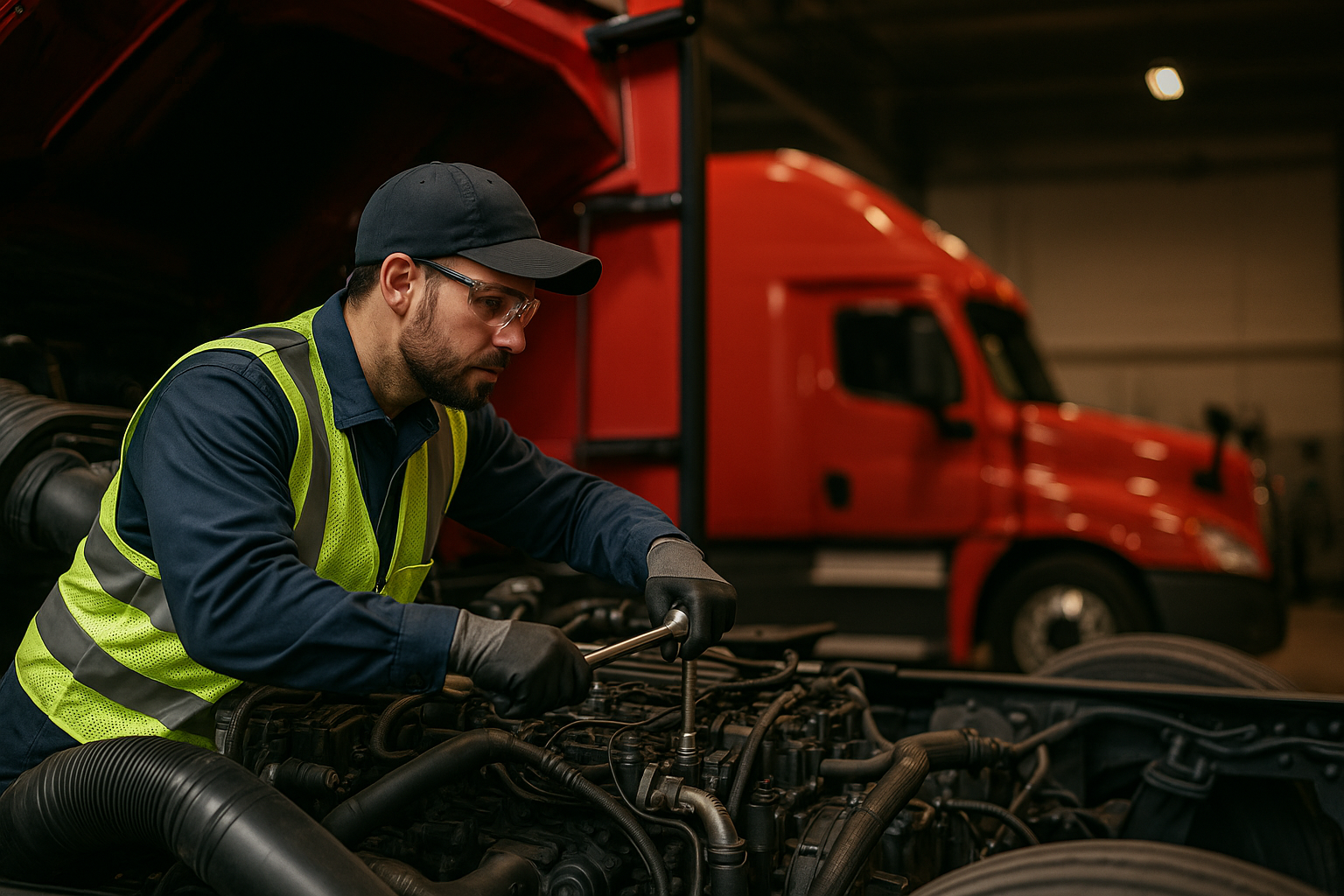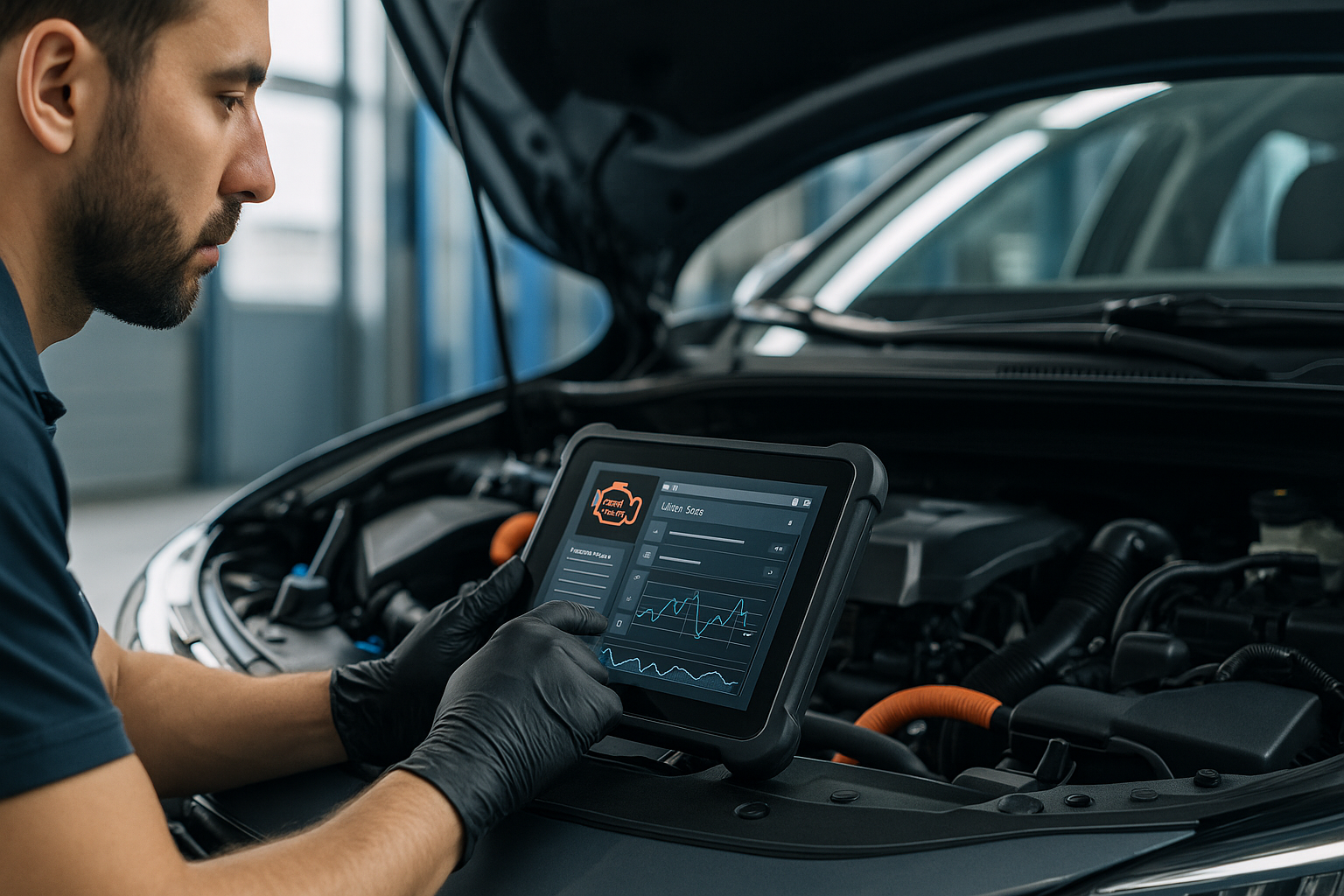Diesel Mechanics Career Opportunities: What to Expect in 2025 and Beyond
Diesel technology powers the backbone of America’s economy. From the trucks delivering goods to stores, to the equipment building infrastructure, to the buses transporting students, diesel engines are everywhere—and they all need skilled technicians to keep them running. With e-commerce driving trucking demand, infrastructure investment accelerating, and a shortage of qualified diesel technicians, this field offers excellent career prospects and competitive wages.
Why Diesel Technology is a Growing Field
Market Drivers
Several powerful forces are creating strong demand for diesel technicians:
- E-commerce boom requiring more trucking capacity
- Infrastructure investment driving heavy equipment needs
- Global supply chain depending on diesel-powered transportation
- Aging equipment fleet requiring maintenance and repair
- Technician shortage creating wage pressure and opportunities
Industry Stability
Diesel mechanics enjoy exceptional job security because:
- Commerce depends on trucking and transportation
- Heavy equipment is essential for construction and agriculture
- Diesel engines are long-lasting and require regular maintenance
- Downtime is expensive, creating urgency for repairs
- Skills are not easily automated or outsourced
Diesel Mechanics Career Paths
Entry-Level Positions
- Shop Helper/Lube Technician: $30,000-$40,000 annually
- Apprentice Diesel Technician: $35,000-$48,000 annually
- Fleet Maintenance Technician: $38,000-$52,000 annually
Experienced Technician Roles
- Diesel Mechanic: $45,000-$65,000 annually
- Heavy Equipment Mechanic: $48,000-$68,000 annually
- Mobile/Field Service Technician: $50,000-$72,000 annually
Specialized and Advanced Positions
- Master Diesel Technician: $60,000-$85,000 annually
- Diagnostic Specialist: $65,000-$90,000 annually
- Shop Foreman/Service Manager: $65,000-$95,000 annually
- Equipment Inspector: $55,000-$80,000 annually
- Dealership Service Manager: $75,000-$120,000+ annually
Specialization Opportunities
By Equipment Type
Heavy-Duty Trucks (Class 7-8)
- Over-the-road semi-trucks
- Delivery and distribution trucks
- Dump trucks and tankers
- Truck-tractor combinations
- Highest volume of work
- Strong demand for qualified technicians
Construction and Mining Equipment
- Excavators and bulldozers
- Loaders and backhoes
- Graders and compactors
- Mining haul trucks
- Specialized hydraulic systems
- Often premium pay rates
Agricultural Equipment
- Tractors (all sizes)
- Combines and harvesters
- Planters and tillage equipment
- Irrigation equipment
- Seasonal demand patterns
- Rural and regional opportunities
Buses and Transit Vehicles
- School buses
- Transit and city buses
- Motor coaches
- Shuttle and tour buses
- Public sector opportunities
- Benefits packages often excellent
Marine and Industrial
- Marine diesel engines (boats, ships)
- Stationary power generation
- Industrial pump drives
- Railroad locomotives
- Specialized knowledge required
- Niche market opportunities
By Work Environment
Dealership Service
- Manufacturer-specific equipment
- Warranty and recall work
- New equipment preparation
- Factory training and support
- Parts availability
- Structured work environment
Fleet Maintenance
- Company-owned truck fleets
- Lease management company fleets
- Municipal vehicle fleets
- Preventive maintenance focus
- Predictable schedules
- Benefits and stability
Field Service
- Mobile repair trucks
- On-site equipment repair
- Construction site service
- Emergency breakdown response
- Travel throughout service area
- Premium pay for mobility
Independent Repair Shops
- Variety of equipment and problems
- Small business atmosphere
- Diverse skill development
- Customer relationship building
- Flexible specialization
Education and Training Requirements
Training Pathways
- Trade school programs: 6 months to 2 years
- Community college programs: 2 years (AAS degree)
- Apprenticeship programs: 3-4 years
- Manufacturer training: Brand-specific programs
- Military training: Army, Navy, Marine Corps diesel programs
Important Certifications
ASE Certifications (Medium-Heavy Truck)
- T1: Gasoline Engines
- T2: Diesel Engines
- T3: Drive Train
- T4: Brakes
- T5: Suspension and Steering
- T6: Electrical/Electronic Systems
- T7: Heating, Ventilation, and A/C
- T8: Preventive Maintenance Inspection
- Master Medium-Heavy Truck Technician
Equipment-Specific Certifications
- EVT (Equipment & Engine Training Council)
- AED (Associated Equipment Distributors)
- Manufacturer certifications: Caterpillar, John Deere, Cummins, Detroit Diesel
- DOT Brake Inspector Certification
- EPA Refrigerant Handling (609)
Specialized Training
- Hydraulic system specialist
- Electronic diagnostic specialist
- Alternative fuel systems (CNG, propane)
- Hybrid electric systems
- Emissions systems specialist
Licensing and Compliance
- Commercial Driver’s License (CDL) helpful for road testing
- State inspection licenses (varies by state)
- Hazardous materials awareness
- OSHA safety training
What Makes a Successful Diesel Technician
Technical Competency
- Understanding of diesel engine principles
- Hydraulic system knowledge
- Electrical and electronic diagnostics
- Fuel injection system expertise
- Emissions system understanding
- Transmission and drivetrain knowledge
- Computer diagnostic proficiency
Problem-Solving Skills
- Systematic troubleshooting approach
- Ability to interpret diagnostic codes
- Root cause analysis
- Research and technical reading
- Logical thinking and deduction
Physical Requirements
- Strength for heavy components and tools
- Stamina for long days of physical work
- Ability to work in tight spaces
- Comfort in dirty, greasy environments
- Tolerance for various weather conditions
- Good vision and manual dexterity
Professional Attributes
- Strong work ethic and reliability
- Safety consciousness
- Attention to detail
- Time management abilities
- Customer service skills (field service)
- Willingness to continue learning
- Team collaboration
Industry Outlook
Job Growth Projections
According to the Bureau of Labor Statistics:
- Diesel technician jobs expected to grow 4% through 2032
- Approximately 28,100 job openings annually
- Critical shortage of qualified technicians
- Competition for skilled workers driving wages up
- Particularly strong demand in trucking sector
Technician Shortage
The industry faces a significant talent gap:
- Estimated shortage of 67,000 diesel technicians by 2026
- Retiring workforce creating openings
- Increasing equipment complexity
- Growing trucking industry needs
- Opportunity for new entrants
High-Demand Employment Sectors
- Trucking and logistics companies: Fleet maintenance
- Equipment dealerships: Sales support and service
- Construction companies: Heavy equipment maintenance
- Agricultural operations: Farm equipment service
- Mining operations: Haul truck and equipment service
- Transit agencies: Bus and transit vehicle maintenance
- Rental companies: United Rentals, Sunbelt, etc.
Tools and Equipment Investment
Essential Hand Tools
Beginning diesel technicians invest in:
- Socket and wrench sets (SAE and metric)
- Specialty diesel tools
- Torque wrenches (various sizes)
- Pry bars and hammers
- Screwdrivers and pliers
- Initial investment: $3,000-$6,000
Diagnostic and Testing Equipment
- Multimeter and test lights
- Compression testers
- Fuel pressure gauges
- Scan tools (OBD and proprietary)
- Laptop with diagnostic software
- Additional investment: $2,000-$5,000
Power Tools and Equipment
- Impact wrenches (air and electric)
- Grinders and cutoff tools
- Drill and impact driver
- Air compressor (home shop)
- Investment: $1,500-$3,000
Employer-Provided Equipment
Most shops provide:
- Vehicle lifts and jacks
- Press equipment
- Engine hoists and stands
- Major diagnostic computers
- Specialized manufacturer tools
- Parts washers and cleaning equipment
Safety Considerations
Primary Hazards
Diesel technicians face specific risks:
- Heavy component injuries (crushing, dropping)
- Burns from hot engines and exhaust
- Chemical exposure (diesel fuel, oils, coolants)
- Noise exposure from equipment
- High-pressure hydraulic fluid injection
- Respiratory hazards from exhaust fumes
- Electrical shock from batteries and systems
Safety Protocols
Professional shops enforce:
- Proper lifting techniques and equipment
- Lock-out/tag-out procedures
- High-pressure system precautions
- Ventilation for running engines
- Confined space entry procedures
- Fire safety protocols
Personal Protective Equipment
Essential safety gear includes:
- Safety glasses (primary requirement)
- Work gloves (multiple types)
- Steel-toed safety boots
- Hearing protection
- Respiratory protection (when needed)
- High-visibility clothing (field work)
- Arc flash protection (electrical work)
Getting Started in Diesel Technology
First Steps
- Research local training programs (trade schools, community colleges)
- Visit equipment dealerships to observe the work
- Consider your interests (trucks vs. equipment vs. agriculture)
- Assess physical readiness for demanding work
- Explore starting positions (shop helper, apprentice)
Choosing the Right Training Program
Look for programs offering:
- Hands-on work with actual equipment
- Modern diagnostic equipment and software
- Multiple equipment type exposure
- ASE test preparation
- Manufacturer partnerships
- Experienced instructor staff
- Job placement assistance
- Up-to-date curriculum (emissions, electronics)
Entry Strategies
Direct Employment Path
- Start as shop helper or lube tech
- Learn on the job
- Employer may support formal training
- Immediate income
- Slower credential accumulation
Training First Path
- Complete certificate or degree program
- Enter with foundational knowledge
- Start at higher position
- Tuition investment required
- Faster advancement potential
Manufacturer Programs
- Brand-specific training (Caterpillar, John Deere, Cummins)
- Often paired with dealership employment
- Cutting-edge technology exposure
- Clear career progression path
- May include paid training or internship
Career Advancement Opportunities
Progression Paths
Diesel technicians commonly advance by:
- Earning ASE Master certification
- Specializing in diagnostics or specific equipment
- Becoming shop foremen or service managers
- Moving into field service (often higher pay)
- Transitioning to equipment sales (technical background valued)
- Starting independent repair businesses
- Becoming manufacturer technical representatives
Business Ownership
Starting a diesel repair business requires:
- Extensive technical expertise
- Business management skills
- Significant capital (facility, equipment, tools)
- Insurance and licensing
- Customer base development
- Parts supplier relationships
Alternative Career Paths
Diesel technology skills transfer to:
- Equipment sales and leasing
- Service management and dispatch
- Fleet management positions
- Equipment rental operations
- Technical training and instruction
- Field service engineering
- Manufacturer technical support
Income and Compensation
Factors Affecting Earnings
- Certification level (ASE Master status)
- Years of experience
- Specialization (diagnostics, specific equipment)
- Geographic location
- Employment sector (dealership vs. fleet vs. field)
- Overtime availability
- Shift differentials (night/weekend work)
Pay Structures
Diesel technicians are commonly paid:
- Hourly wage: Most common structure
- Flat-rate: Paid by job completion (some dealerships)
- Salary: Management and specialized positions
- Combination: Base pay plus performance incentives
Additional Compensation
Many diesel technician positions offer:
- Overtime opportunities (often abundant)
- Shift differentials (second and third shift)
- Health insurance and benefits
- Retirement plans (401k or pension)
- Tool allowances or purchase programs
- Continuing education support
- Company vehicle (field service positions)
- Travel per diem (field service)
- Performance bonuses
Field Service Premium
Mobile technicians often earn more due to:
- Travel time compensation
- Higher base pay rates
- Emergency call premiums
- Mileage reimbursement
- Can add $10,000-$20,000 to base salary
Technology and Future Trends
Emerging Technologies
Modern diesel technicians work with:
- Advanced emissions systems (DEF, DPF, SCR)
- Electronic control systems
- Telematics and remote diagnostics
- Hybrid electric drivetrains
- Alternative fuels (CNG, LNG, biodiesel)
- Automated transmission systems
Future of Diesel
Despite electric vehicle growth:
- Diesel remains dominant for heavy-duty applications
- Battery technology limitations for heavy loads/long range
- Existing fleet requires ongoing service
- New clean diesel technologies emerging
- Hydrogen fuel cells (diesel-related skills)
- Career longevity remains strong
Skills for the Future
Tomorrow’s diesel technicians will need:
- Advanced electronics troubleshooting
- Software diagnostic abilities
- Hybrid system knowledge
- Alternative fuel expertise
- Computer networking understanding
- Continuous learning commitment
Work-Life Considerations
Positive Aspects
- Strong income potential
- Job security and stability
- Variety of work (different equipment, problems)
- Satisfaction of problem-solving
- Physical activity (not sedentary)
- Clear career advancement path
- Recession-resistant field
Challenging Aspects
Be prepared for:
- Physically demanding work
- Dirty, greasy working conditions
- Potential overtime and irregular hours
- Weather exposure (field service, some shops)
- Noise in work environments
- Continuous need to update skills
- Some positions require travel
Conclusion
Diesel technology offers an outstanding career path for those seeking a stable, well-paying profession with growth potential. The critical shortage of qualified diesel technicians, combined with the essential nature of diesel-powered equipment to commerce and industry, creates exceptional opportunities for those entering the field.
Whether you’re interested in working on heavy-duty trucks keeping America’s supply chain moving, construction equipment building infrastructure, agricultural machinery feeding the nation, or specialized industrial applications, diesel technology offers diverse specializations to match your interests.
The work is demanding—both physically and intellectually—but the rewards are substantial. With competitive wages, excellent benefits, strong job security, and the satisfaction of diagnosing and solving complex mechanical problems, diesel technology provides a solid foundation for a rewarding career.
As equipment becomes more sophisticated, integrating advanced electronics with mechanical systems, the role of diesel technician is evolving into a high-tech profession commanding respect and premium compensation. If you enjoy working with powerful equipment, appreciate the combination of mechanical and electronic systems, and want a career that can’t be outsourced or automated, diesel technology deserves serious consideration.
Ready to power your career? Research diesel technology programs in your area and take the first step toward joining this essential and well-compensated trade.



